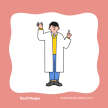Causes of male sexual dysfunction & Solution
Erectile dysfunction (ED),Prostate problems

Causes of male sexual dysfunction
Male sexual dysfunction is a complex issue that can be caused by a variety of factors, both physical and psychological. Some common causes of male sexual dysfunction include:
Physical health issues: Certain medical conditions such as cardiovascular disease, diabetes, neurological disorders, hormonal imbalances, and prostate surgery can affect a man's ability to achieve and maintain an erection.
Medications: Some medications, including antidepressants, antihistamines, and blood pressure medications, can have sexual side effects, including erectile dysfunction.
Substance abuse: Substance abuse, particularly the use of alcohol, tobacco, and illegal drugs, can contribute to male sexual dysfunction.
Psychological factors: Anxiety, depression, stress, relationship issues, and performance anxiety can all impact a man's sexual function and cause erectile dysfunction.

Age: As men age, the risk of developing erectile dysfunction increases. Age-related changes in testosterone levels, cardiovascular health, and the functioning of the nervous system can all contribute to sexual dysfunction.
Lifestyle factors: A sedentary lifestyle, poor diet, and lack of physical activity can all contribute to sexual dysfunction.
Peyronie's disease: This is a condition in which scar tissue builds up in the penis, causing it to bend or curve during an erection.
Priapism: This is a persistent, painful erection that can last for several hours and is not related to sexual arousal.
Low testosterone: Testosterone is the primary male sex hormone, and low levels of testosterone can impact sexual function and cause erectile dysfunction.
It's important to note that male sexual dysfunction can have multiple causes and that it can often be a combination of physical and psychological factors. In some cases, the cause of male sexual dysfunction may be difficult to determine, and a thorough evaluation by a healthcare provider is necessary to identify the underlying cause and develop an effective treatment plan.
In conclusion, male sexual dysfunction is a complex issue that can be caused by a variety of physical and psychological factors. It's important to seek help from a healthcare provider if you're experiencing sexual difficulties, as effective treatments are available to help manage the symptoms.
Erectile dysfunction (ED)
Erectile dysfunction (ED) is a common male sexual disorder characterized by the inability to achieve or maintain an erection sufficient for satisfactory sexual activity. ED is not a single condition, but rather a complex problem that can have multiple causes.

Physical causes: Physical causes of ED include cardiovascular disease, diabetes, hormonal imbalances, neurological disorders, prostate surgery, and injury to the penis or pelvic area. Additionally, certain medications, including antidepressants and blood pressure medications, can have sexual side effects that can lead to ED.
Psychological causes: Psychological factors such as anxiety, depression, stress, relationship problems, and performance anxiety can all contribute to ED. These psychological factors can cause changes in a man's sexual response and make it difficult to achieve or maintain an erection.
Lifestyle factors: Lifestyle factors, such as a sedentary lifestyle, poor diet, and lack of physical activity, can contribute to ED. Substance abuse, particularly the use of alcohol and tobacco, can also have a negative impact on sexual function and contribute to ED.
Aging: As men age, the risk of developing ED increases due to age-related changes in testosterone levels, cardiovascular health, and the functioning of the nervous system.
Peyronie's disease: This is a condition in which scar tissue builds up in the penis, causing it to bend or curve during an erection.
Low testosterone: Low testosterone levels can impact sexual function and cause ED.
It's important to note that ED can have multiple causes, and it is often a combination of physical and psychological factors that contribute to the disorder.

Diagnosis of ED typically involves a thorough medical and sexual history evaluation, physical examination, and laboratory testing. In some cases, additional tests, such as ultrasound or penile injections, may be necessary to confirm the diagnosis.
Treatment for ED depends on the underlying cause of the disorder. Some common treatment options include oral medications, such as phosphodiesterase-5 (PDE-5) inhibitors, penile injections, penile implants, and vacuum devices. In some cases, psychological counseling may be recommended to help manage stress and improve sexual function.
Lifestyle changes, such as maintaining a healthy diet and engaging in regular physical activity, can also help improve ED. Quitting smoking, reducing alcohol consumption, and avoiding the use of illegal drugs can also have a positive impact on sexual function.
In conclusion, ED is a common male sexual disorder that can have multiple causes. Effective treatments are available to help manage the symptoms of ED, and it is important to seek help from a healthcare provider if you're experiencing difficulties with sexual function. A thorough evaluation can help identify the underlying cause of ED and develop an effective treatment plan.
Prostate problems
Prostate problems are a common health concern for many men as they age. The prostate is a small gland located just below the bladder that plays an important role in the reproductive system. When problems develop in the prostate, they can affect a man's overall health and well-being, as well as his ability to urinate and have sex.

Prostate enlargement (BPH): Benign prostatic hyperplasia (BPH) is a noncancerous enlargement of the prostate that can occur as men age. This condition can cause urinary symptoms such as difficulty starting urination, a weak urine stream, frequent urination, and a need to urinate at night. BPH can also cause urinary tract infections, bladder stones, and incontinence.
Prostatitis: This is inflammation of the prostate gland that can cause pain, discomfort, and urinary symptoms. Prostatitis can be caused by bacterial infections, but in many cases, the cause is unknown.
Prostate cancer: Prostate cancer is a type of cancer that affects the prostate gland. It is one of the most common types of cancer in men, and it is typically diagnosed in older men. Prostate cancer can cause urinary symptoms similar to those of BPH, but it can also cause weight loss, fatigue, and bone pain.
Diagnosis of prostate problems typically involves a thorough medical and sexual history evaluation, physical examination, and laboratory testing, including a prostate-specific antigen (PSA) test. In some cases, additional tests, such as a biopsy or ultrasound, may be necessary to confirm the diagnosis.
Treatment for prostate problems depends on the underlying cause of the condition. For BPH, treatment may include medications, minimally invasive procedures, or surgery. For prostatitis, treatment may include antibiotics, pain medications, and lifestyle changes, such as regular exercise and reducing stress. For prostate cancer, treatment may include surgery, radiation therapy, or hormone therapy, and in some cases, a combination of these treatments may be recommended.
In conclusion, prostate problems are a common health concern for many men as they age. Effective treatments are available for a variety of prostate problems, including BPH, prostatitis, and prostate cancer. If you're experiencing symptoms of a prostate problem, it's important to seek help from a healthcare provider to determine the underlying cause and develop an effective treatment plan. Regular screening and early detection are key to managing prostate problems and reducing the risk of complications.
About the Creator
HealthTempo
Thank you for visiting "HealthTEMPO". Our goal is to help everyone lead a healthy life through useful information.






Comments
There are no comments for this story
Be the first to respond and start the conversation.